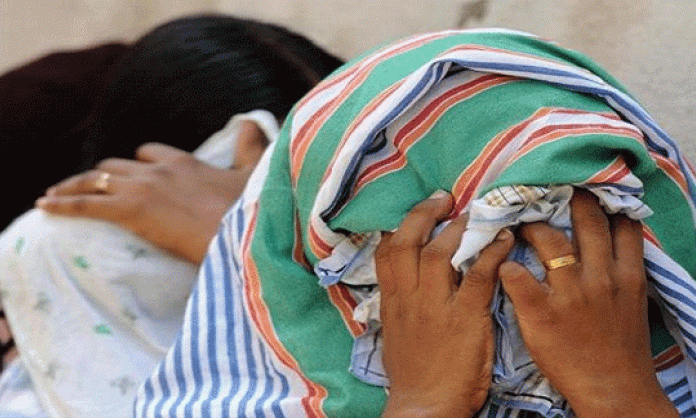The Moss Review, an independent report into asylum seeker safety on Nauru, released on 20 March, has found evidence of widespread abuse. The report details one incident in which a guard demanded to see a woman naked in exchange for allowing her and her child two additional minutes in the shower.
Tony Abbott says that this sort of thing is to be expected in Australia’s mandatory detention network. “In any institution you get things that occasionally aren’t perfect”, he said, responding to questions about the report in an interview on 2GB.
It has long been clear that the government has a perverse view of right and wrong, but recent events reveal how divorced it is from basic social norms, and the lengths to which it will go to bury the truth.
Just two weeks prior to the Moss Review’s release, Greens senator Sarah Hanson-Young uncovered an intelligence report prepared by Transfield, the company contracted to run security on Nauru. The report, made in September 2014, gives a picture of the company’s campaign against disaffected welfare workers on Nauru.
Unmistakable in the Transfield report is the message that the government and its contractors are more concerned about information being leaked from Nauru than about the heinous crimes being committed there.
Using parliamentary privilege, Hanson-Young read the intelligence report into the public record during a sitting of the Senate. It details measures taken to monitor detention centre staff for signs of dissent.
One passage about a particular worker, perceived to be a ringleader, reads: “AB may be influencing members of SCA [Save the Children] staff who were previously compliant and diligent SCA caseworkers who were now … more vocal in promulgating views that were not commensurate with the work SCA staff are required to do in and out of the NRPC [Nauru Regional Processing Centre].”
Later the report reads: “Information has also been received which suggests that SCA staff facilitated the distribution and collection of a petition against offshore processing … further information suggests that it was removed and taken back to Australia by SCA staff in the last few days for onward transmission to an external entity.”
Last year, 10 Save the Children staff were removed from Nauru without explanation. Recently leaked transcripts from interviews carried out in the preparation of the Moss Review show the real agenda behind the removals. Obtained by independent media outlet New Matilda, the leaks include an interview with Mark Cormack, a former senior Immigration Department official. The interview details a conversation he had with the then immigration minister Scott Morrison.
“I said to the Minister, ‘Minister what I’m going to do is I’m going to get a list of the names of the people who were identified as orchestrating or participating in this kind of behaviour. I will get a list put to me, and I will exercise a right under our contract to have those people removed.”
For months, media attention has focused on goverment accusations that these welfare workers were coaching refugees to self-harm in order to attract sympathy from the public.
Unlike the tidal wave of sexual assault allegations referred to the Moss Review, not one concrete example of misconduct on behalf of welfare workers has been raised to back up the slander against them. Now, after investigating the allegations against Save the Children staff, the Moss Review has reported that it “has not obtained any information which substantiates the alleged misconduct”.
Senator Hanson-Young has labelled the public campaign against these workers a “witch-hunt against whistleblowers who are concerned for the welfare of the people in their care”. Their only “crime”, she says, “was to report accusations of abuse and the inappropriate behaviour of security guards”.
Phillip Moss, a former integrity commissioner who authored the Moss Review, has detailed allegations of rape, guards offering drugs in return for sex, abuse of children, rampant sexual harassment and other physical attacks. The report also concludes that under-reporting of abuse on Nauru is likely.
Yet, according to the harrowing logic of the Immigration Department, the real crime is speaking out about condition on Nauru. The following passage from Transfield’s intelligence report highlights what the government and its contractors are really afraid of: “Incident reporting by SCA staff at the NRPC has also been noted to be increasingly emotive in recent weeks. In some cases, this reporting is using language and descriptive imagery that seeks to paint service providers in a bad light.”
The situation in both Nauru and Manus Island has been in nearly continual crisis for more than a year. Time and again, refugees have stood up to the repressive apparatus that oversees their detention. When they do, the government is forced to expend more energy trying to obscure the reality of the camps.
Unfortunately for the government, its detention network also requires an army of staff to function. Increasingly, workers are objecting to the torture they witness.
Mark Isaacs, a former Salvation Army worker who spoke out about his time on Nauru in his book The Undesirables, reveals the dilemma many face. At first, he felt like he was helping refugees in detention, but this idea couldn’t last.
“There was no way I could deny I was a part of it, because there I was and it was my country and my people and we were putting these men through such torture … The camp was built around destroying men, grinding them into the dust.”









